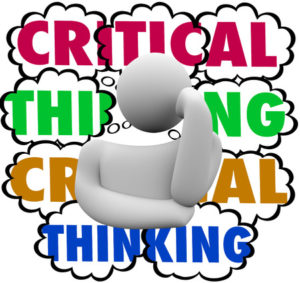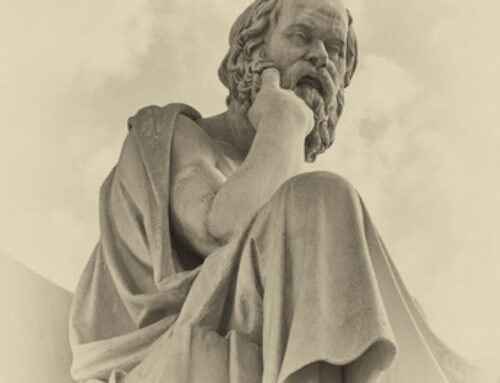 In a recent essay I noted that critical thinking is a more reliable guide to behavior than emotion, provided it is controlled and directed toward truth. I added that the aim of critical thinking should not just be to evaluate other people’s words and actions, but also, indeed foremost, to evaluate our own thoughts, words, and actions. This essay will look more closely at the benefits of examining our existing ideas and the new ones that barrage us daily.
In a recent essay I noted that critical thinking is a more reliable guide to behavior than emotion, provided it is controlled and directed toward truth. I added that the aim of critical thinking should not just be to evaluate other people’s words and actions, but also, indeed foremost, to evaluate our own thoughts, words, and actions. This essay will look more closely at the benefits of examining our existing ideas and the new ones that barrage us daily.
Our minds are a veritable storehouse of data, much of which we are unaware is there until it reminds us of its presence. Here are three examples that have long occupied space in my personal storehouse and recently came to mind:
“Winston tastes good, like a cigarette should.” “LSMFT, Lucky Strike means fine tobacco.” “You’ll wonder where the yellow went, when you brush your teeth with Pepsodent.””Dream Girl, Dream Girl, beautiful Luster Cream girl . . . you owe your crowning glory to your Luster Cream shampoo.”
The first two examples have been in the recesses of my mind for over 50 years, even though I haven’t had a cigarette in all that time. The toothpaste example was a popular advertisement of the same vintage. I woke up thinking of the Luster Cream one a few months ago for no discernable reason. What all four examples have in common is that they entered my mind multiple times, always without invitation, and once there their residence was permanent. No program exists for erasing them. It is possible, of course for memory of them to fade, but not to vanish.
Those four examples are a small sample of the hundreds of thousands of bits of data that reside in my mental bank. A good number of them are advertisements for things people have wanted me to buy. Others are meaningful statements by scholars or statesmen, such as JFK’s “Don’t ask what your country can do for you; ask what you can do for your country”; the titles of books filled with wisdom, notably Viktor Frankl’s Man’s Search for Meaning; and songs that once touched my heart, such as Irving Berlin’s “I’ll Be Loving You Always”.
Also in my mind are countless ideas that I have examined, tested, and embraced as guides to living, most notably Christ’s directive to “Love the Lord your God with all your heart and with all your soul and with all your mind and with all your strength . . . [and] Love your neighbor as yourself.” (Mark 12:30,31) And, to name just a few more examples, the ideas that truth is discovered rather than created, reason is more reliable than emotion, and self-esteem is meaningful only when earned.
However, despite my diligence in testing ideas before I embrace them, it is likely that some ideas have slipped past my observation and now are indistinguishable from the carefully tested ones. I say this because the deluge of ideas has increased in every decade of the last century and is expanding as information sources multiply. This has not only been the case with me, but with everyone. Every day we are bombarded with daunting numbers of new ideas, many of which directly oppose our long-held beliefs. Worse, many purveyors of those ideas expect us to embrace them without questioning them, let alone challenging them. And if we fail to meet that expectation, they are quick to suppress debate, demonize us, and cancel expression of our views.
So how should we deal with this growing dilemma? We can’t be sure which of the ideas in our minds have not been carefully and critically formed. One thing we can do is give other people’s criticism of our own ideas a fair hearing. To do this is to practice humility, even with ideas we know have been carefully formed. But this is difficult to do, especially when our critics do not reciprocate our fairness.
I believe the best approach is to cultivate the curiosity almost all of us had as children but lost when our parents tired of answering “Why Mommy? Why Daddy? What is that? Why is it that way? “And when our teachers were too busy keeping pace with the curriculum to indulge 20 or 30 students’ curiosity.
How important is curiosity? Consider these assessments:
Those with a lively sense of curiosity learn something new every day of their lives. Anonymous
A generous and elevated mind is distinguished by nothing more certainly than an eminent degree of curiosity. Samuel Johnson
You can teach a student a lesson a day; but if you can teach him to learn by creating curiosity, he will continue the learning process as long as he lives. Clay P. Bedford
I have no special talents. I am only passionately curious . . . The important thing is not to stop questioning. Albert Einstein
Millions saw the apple fall, but only Newton asked why. Bernard Baruch
What is now proved was once only imagined. William Blake
Whoever retains the natural curiosity of childhood is never bored or dull. Anonymous
I keep six honest serving-men—they taught me all I know; Their names are What and Why and When and How and Where and Who. Rudyard Kipling
Part 2 of this essay will demonstrate how to restore the natural curiosity of childhood.
Copyright © 2023 by Vincent Ryan Ruggiero. All rights reserved


